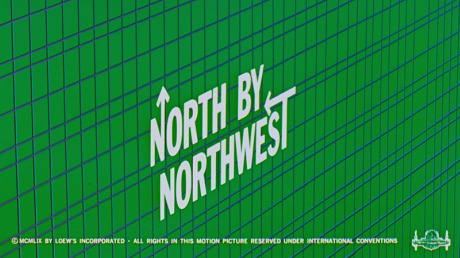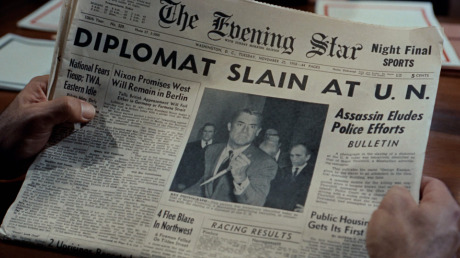Salon‘s Matt Zoller Seitz has asked an array of film writers and filmmakers to share their greatest (most vivid, transporting, surprising, impassioned, absurd) moviegoing memories. Or, as the subhead puts it, “the sights, sounds and feelings that have stayed long after the lights came up.”

I’m one of about 14 or 15 contributors. (My story is about a calamitous Manhattan screening of North by Nothwest that happened about…good God, 30 years ago.) The articles are short, nicely edited, illustrated. It seems extra cool that under each movie title the where and when (i.e., which theatre and in what town/city the special experience happened in, and the year) are provided.
Here’s mine:
“In 1980 or ’81 I attended a weekend showing of Alfred Hitchcock‘s 1959 thriller North by Northwest at the Regency, an Upper West Side rep house owned by Dan Talbot. It was a late-afternoon screening, which to me indicated that a fair number of hard-core Hitchcockians were in attendance.
“Sometime around the end of the 20th Century Limited train scenes and the crop-duster sequence, the projectionist skipped a reel. Thirteen or 14 minutes’ worth bypassed!
“Silence, at first. And then whistles, claps, hoots, ‘Yo!’
“The dumb-shit projectionist (whom I instantly envisioned as being a cousin of Pete, the Akim Tamiroff-resembling Greek diner owner played by John Belushi in an old SNL skit) wasn’t responding.
“All at once three or four of us got up and walked into the lobby and bounded up the stairs to the projection booth. Knock-knock, bang-bang…hey, man! Which the projectionist completely ignored. He was scared, we later realized, and had called the manager. But our blood was up. Skipping an entire reel of North by Northwest was an outrage…hey! Bang-bang, boom-boom, ‘Canary bird, will ya get outta the bathroom?’
“Finally the manager responded, but like a riot policeman. He ran up to the projection booth door and turned toward us, panicked expression, back proverbially arched. ‘Get back! Get back!’ His eyes and tone of voice were exactly like those of Marcel Bozzuffi, the French assassin in The French Connection who tried to shoot Gene Hackman and was later cornered on a moving subway train by MTA cops.

“Why did the Regency projectionist (aka ‘Pete’) and the manager go into Defcon 1 mode? Why didn’t they simply smile and raise their hands and say, ‘Okay, we get it, guys…we made a mistake…we’ll fix it right away’? That would have shut us up immediately. Instead were treated as raucous invaders rather than justifiably motivated film buffs, and so we the people got angrier than we should have.
“There’s a lesson in civic relations here, but particularly one for theater owners. That lesson is ‘film buffs are always right.’ If they say the sound is muffled or weak, it probably is. Don’t debate it — fix it!
“The next day I got a call from someone in Talbot’s office. I was the bad guy, in their view. I had caused the problem.
“Well…but of course!”
Here’s another good one, about a 1996 viewing of Striptease at a Mahattan Cineplex Odeon, written by Daniel McKleinfeld:
“The most memorable movie-theater moments usually happen during bad movies, not good ones. There’s something about watching a truly wretched flick that bonds the audience together like a platoon slogging through an infested jungle. Back in the ’90s, the best place to do such slogging was the Cineplex Odeon, the last second-run house in NYC, where movies got one last chance to hobble across the stage before collapsing into the video racks. And it was there that I had the most powerful moment of personal validation ever to take place in a movie theater.
“Tickets to the Cineplex Odeon were $2, a price that encouraged teens on cheap dates, and marginally employed artists. So competition was fierce to be the most entertaining thing in the room, not excluding that thing on-screen. But for a while, the Demi Moore vehicle Striptease had us all struck dumb — the crazy shifts in tone, the tacky costumes, Ving Rhames’ Samuel-Jackson-on-codeine act — there was just nothing to say.

“But then, about a third of the way through, the movie steps out of the strip club. We have a long scene laying out the details of our heroine’s custody battle. Moore, refusing to let a little girl see her mom crumble, sends her daughter to play on the beach. The camera pushes slooooowly toward Moore’s radiant face, a single tear welling up in her eye. We cut to the little girl, gaily skipping across the beach as the sun sets. We push in toward Moore’s welling tear ducts. Closer…closer…the tear begins to fall.
“And I yell: ‘MORE STRIPPING!’
“At that very instant, smash-cut to rhinestone-covered ta-tas, flouncing across the stage at the Eager Beaver.
“I at once respond: ‘THANK YOU!’ And the crowd goes wild.
“I may never be that cool again.”
